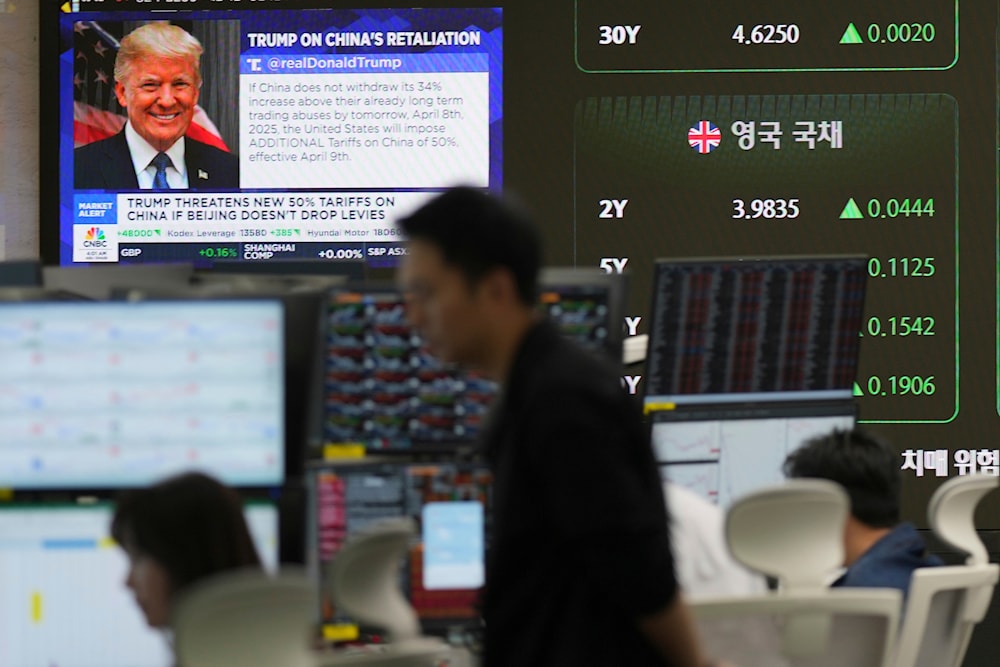US tariffs threaten $2 trillion in global investments: Financial Times
Companies have pledged at least $1.9 trillion in US investments since Trump's presidency, but a growing tariff war and global uncertainty now threaten the viability of those commitments, according to the Financial Times.
-

Currency traders watch computer monitors near the screen showing news reporting with a picture of President Donald Trump at a foreign exchange dealing room in Seoul, South Korea, on April 8, 2025. (AP)
The Financial Times (FT) reported on Tuesday that since the beginning of Donald Trump's presidency, companies have pledged to invest at least $1.9 trillion in the US, arguing that the spending bonanza is under the threat of a tariff war.
Overseas and US companies have pledged $1.9 trillion in investments, according to Financial Times analysis, compared to $910 billion in private manufacturing investments from the start of Biden's presidency until October 2024, per the US Commerce Department.
According to the report, recent commitments include $100 billion from SoftBank and chipmaker TSMC, $20 billion from CMA CGM, $500 billion from Apple, and $5 billion from Stellantis. However, many of these pledges come from businesses with global supply chains vulnerable to the tariffs announced by Trump against China, India, and the EU.
Teresa Fort, an associate professor and international trade expert at Dartmouth College, stated that the impact of Trump's tariffs would extend beyond the $1.9 trillion in investment pledges already made, "The amount of uncertainty that he has introduced to the world trading system means that nobody is in a position to make long-term investments. It is going to make the US a less attractive place to invest in."
Global concerns over US tariffs
The FT report mentioned that Trump claimed in late March that money was "pouring in" due to his trade policies. However, after he announced a 20% tariff on EU imports, French President Emmanuel Macron advised companies to pause US investment as his government works with the European Commission on the EU's response.
Calling on industries to also refrain from trying to negotiate exemptions with Washington, Macron said, “What message would we send by having major European players investing billions of euros in the American economy at a time when [the US] are hitting us?"
According to the report, Japan’s Foreign Ministry stated on Monday that Prime Minister Shigeru Ishiba expressed strong concerns during a phone call with Trump, warning that US tariff measures could weaken investment capacity among Japanese companies, which are the top foreign investors in the US.
While some analysts suggest that Trump's protectionist policies may prompt increased investment in US production as countries seek concessions, the report stated that the Capgemini Research Institute earlier this year predicted that US companies could spend $1.1 trillion on reshoring manufacturing by 2027, up from the $750 billion forecast for 2024.
However, Scott Lincicome, vice president of the free-market Cato Institute think tank, cautioned that a decline in corporate earnings, higher production costs, and a slowdown in the US economy due to the tariffs could reduce investment interest.
“Whoever had the plan to use these [investment] announcements to get the tariffs to go away or slow down has proven to be pretty wrong-headed,” Lincicome said. “It’s impossible to look at the tariffs that were announced as some sort of systematic plan to induce long-term investment.”
Tariff uncertainty raises concerns
According to the report, Stellantis will furlough 900 workers and halt production in Canada and Mexico due to tariff uncertainty. Experts caution that many investment pledges may include pre-existing plans, making it difficult to predict how much will materialize.
“These investment announcements, coming in January or February, cannot be the result of the new incoming administration,” said one US academic focused on management, noting that financial planning happened over longer timescales.
The FT report mentioned that Apple announced a $500bn investment in February but saw a loss of over $300bn in market value after Trump introduced tariffs that affected its supply and production hubs in Asia. While Apple already invests heavily in the US, the impact of Trump's policies remains unclear.
South Korea's Hyundai pledged $21 billion over three years to expand US production and create 100,000 jobs, despite facing a 25% tariff on foreign-made cars sold in the US and an additional 25% tariff on all South Korean imports.
SoftBank, led by CEO Masayoshi Son, surpassed a $50bn pledge made after Trump's 2016 election win, creating over 50,000 jobs, according to FT. However, analyst Kirk Boodry warned that SoftBank could be forced to sell assets if tariffs lead to a prolonged market downturn, as seen during the 2020 pandemic.

 4 Min Read
4 Min Read










